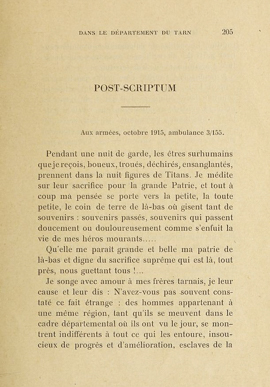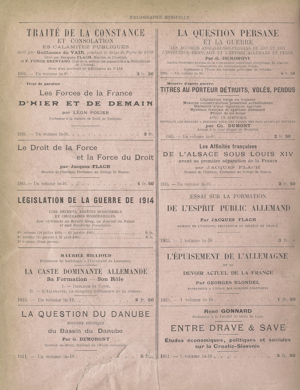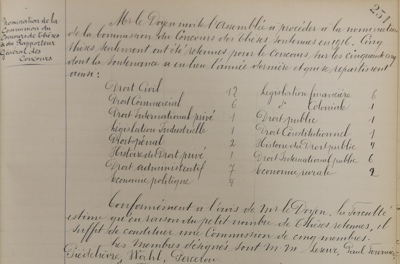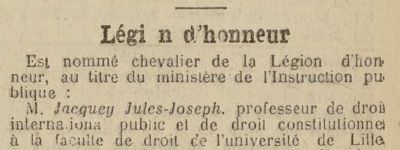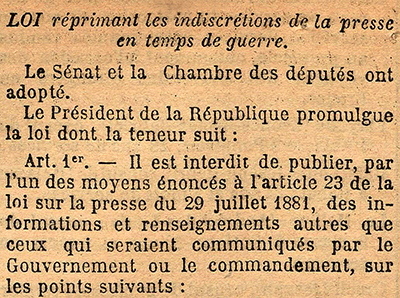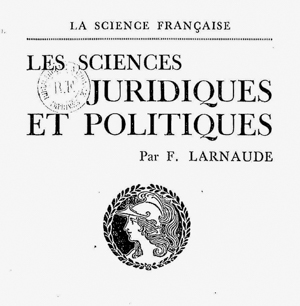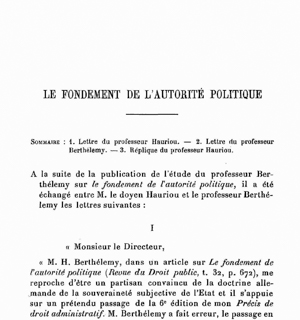15 June 20239 November 2024 Des facultés sur le front du droitRemembrance Traces of memorial practices in remembrance of law faculty academics who died during the Great War : Brussels, Leuven, Liège Those who gave their lives for an ideal of justice, those who died for the law, have left the survivors a legacy that must not be made up solely of contempt and hatred. Paul Héger, Academic opening session of the Free University of Brussels, January 21, 1919. Confronted with the magnitude and violence of the mass death caused by the Great War, the deep trauma that ensued drove society towards an irrepressible need to mourn and remember those lost. Mourning is an intrinsic part of the war experience. It is present from the outset of combatpour lire la suite…
Author: Des facultés sur le front du droit
War and peace
“[…] And honored be our great dead, who made this victory for us ! […] Through them, we can say that before any armistice, France was liberated by the power of arms […]. As for the living, to whom, from that day, we extend our hand and whom we will welcome, when they walk on our boulevards, on their way to the Arc de Triomphe, may they be saluted in advance ! We are waiting for them for the great work of social reconstruction […] Thanks to them, France, yesterday a soldier of God, today a soldier of humanity, will always be the soldier of ideal !” (Georges Clemenceau, Extracts from the speech delivered before the Chamber of Deputies on November 11, 1918). With these words spoken on thepour lire la suite…
The doctoral theses of the Toulouse Faculty of Law in the face of war
A break in doctoral practices The first effect of the war on the production of theses at the Toulouse Faculty of Law was first observed in the number of theses defended, which decreased drastically in 1914. The pre-war years saw regular defenses for thirty to forty theses, and even though the year 1911, with its 50 theses, marked the beginning of a decline (due both to a change in the conditions for awarding the doctorate in Toulouse in 1911 and a general decline in the number of students in all the faculties of the south affected by competition from Limoges and Clermont-Ferrand from 1909), the two years before the war still saw 34 and 25 doctoral defenses respectively. But a total collapse occurred from the beginning of the war : only one thesispour lire la suite…
Between science and patriotism : legal journals at war (1914-1918)
In the summer of 1914, an unprecedented armed conflict broke out in Europe. The breadth, brutality and global spread of this war, which was imagined to be short, earned it the name of “the Great War” ; it was also to be “the war to end all wars”. However, before the sound of the first cannons, before the first trenches were dug, a class of the population was already particularly mobilized on another front. Indeed, French and German scientists had been engaged for several decades already in a real “war of science” in physics, chemistry, medicine, war exalted by patriotic sentiment and by continuous progress in these disciplines. In law, the scholarly conflict had been raging for much longer still, opposing French jurists, their “rational” model andpour lire la suite…
The Paris Faculty of Law in the war for law
The First World War was a pivotal moment for the Paris Faculty of Law. As the largest law school in France, it soon had to deal with an exceptional situation that deprived it of part of its students and professors. Under the impetus of its dean, Ferdinand Larnaude, the faculty was put at the service of France’s war against Germany, an intellectual struggle of law against force that enrolled both professors and students. War against the Paris Faculty of Law : the transformations of education The declaration of war in August 1914 surprised the faculty during the end of the examination period and upset the start of the academic year 1914-1915. Student numbers dropped throughout the war. Several teachers, of an age to be mobilized by the army,pour lire la suite…
Legal literature at war
15 June 20239 November 2023 Des facultés sur le front du droitLegal literature at war The Paris Faculty of Law in the war for law The First World War was a pivotal moment for the Paris Faculty of Law. As the largest law school in France, it soon had to deal with an exceptional situation that deprived it of part of its students and professors. Under the impetus of its dean, Ferdinand Larnaude, the faculty was put at the service of France’s war against Germany, an intellectual struggle of law against force that enrolled both professors and students. War against the Paris Faculty of Law : the transformations of education The declaration of war in August 1914 surprised the faculty during the end of the examination periodpour lire la suite…
Jules Jacquey (1852-1927) : Can the occupying forces be fought with the law ?
Jules Jacquey’s career was coming to an end when the war broke out, a career that had taken place exclusively in Lille since he was appointed there in 1885, the year following his success at the aggregation. This anchoring was quite rare for a native of another region, in this case Haute-Saône. No doubt we must see the effect of his marriage, celebrated in Bergues in 1885, as the bride came from a family rooted in Flanders. At the end of the summer of 1914, frightened by the rumors of barbarism peddled by the refugees from Belgium, the jurists – magistrates, lawyers and professors -, took, in large numbers, the path of exodus. In October, only four of the sixteen law school professors remained or returned to Lille :pour lire la suite…
The reflections of a Bordeaux law professor on freedom of opinion : Duguit and press censorship during the 1914-1918 war
Propaganda occupied a prominent place in the history of the Great War, because of its total and spectacular character. Even today, few textbooks address the years 1914-1918 without mentioning the word “brainwashing”, describing the unanimous and ubiquitous media tone at the beginning of the conflict, exacerbating heroism and national assets while demonizing – even ridiculing – the German enemy. The main challenge was then to convince citizens of the correctness and the merits of the war. Censorship, a negative and complementary aspect of propaganda, was an equally total institution. Total, because the control it exercised extended to all political actors (members of the government, political parties), to all written production (press and publishing) as well as live performances (theater, songs). If the First World War contributed topour lire la suite…
Legal propaganda in the Great War : the example of Ferdinand Larnaude’s Sciences juridiques et politiques [Legal and Political Sciences] (1915)
In 1915, the World’s Fair left the Old Continent for the United States ; this was not a first, since Philadelphia, Chicago and St. Louis had already hosted this event before. Recovering from the terrible earthquake of 1906, the city of San Francisco was this time chosen to receive the exhibitors of the twenty-four participating countries ; between March and December 1915, it would welcome about nineteen million visitors. The event, as always, revolved around a major theme. For this iteration, it was the Panama Canal, completed and inaugurated a year earlier, that was in the spotlight : the exhibition was renamed “Panama- Pacific” for the occasion. Indeed, this canal, whose titanic work began in 1882, allowed an unprecedented expansion of maritime trade and contributed to the strongpour lire la suite…
The uses of war in public law controversy
The doctrinal positions of lawyers were directly impacted by the conflict. A double re-reading of legal thought was carried out : because of the war, by the rediscovery and the highlighting of the radical opposition of the French and German doctrine of law and the state, but also in relation to the war, according to an enterprise of labeling and denial of certain theoretical commitments that could be demonized from their supposed kinship with the doctrine on the other side of the Rhine. In this case, the divisions were reinterpreted using the passions and affects generated by the conflict. If, under the first aspect, the legal doctrine was therefore clearly instrumentalized in the service of the victory of the nation, under the second, it was onpour lire la suite…

